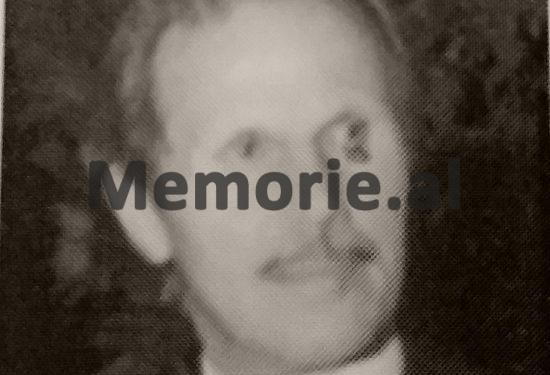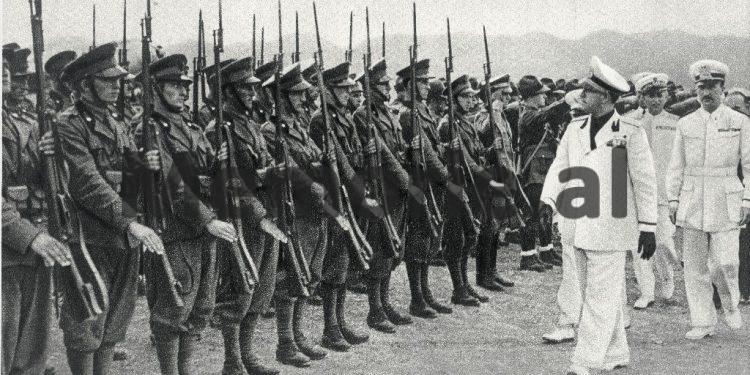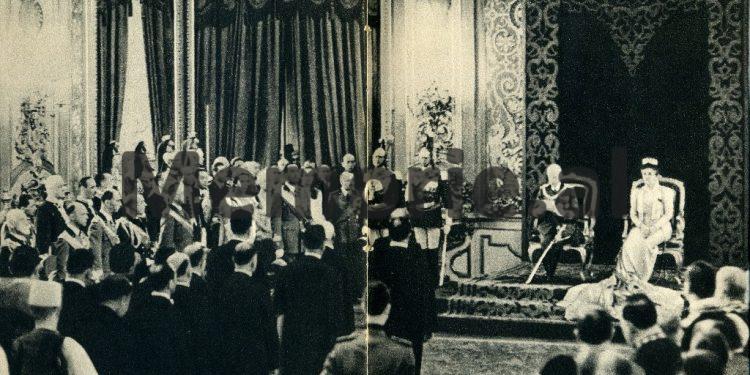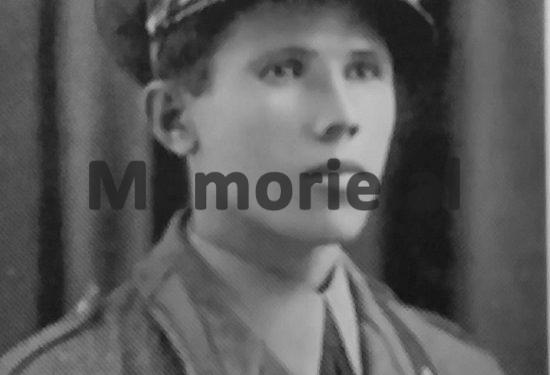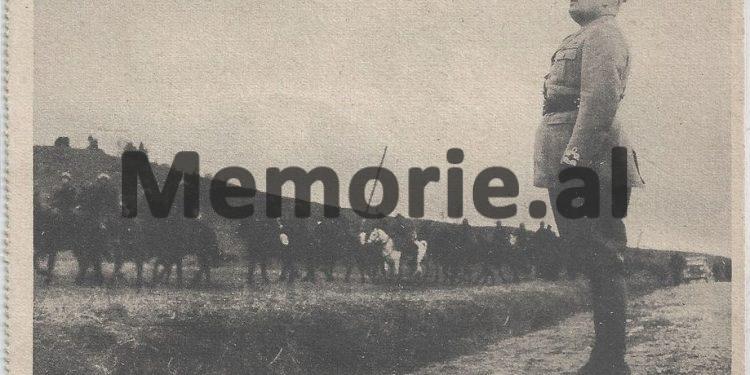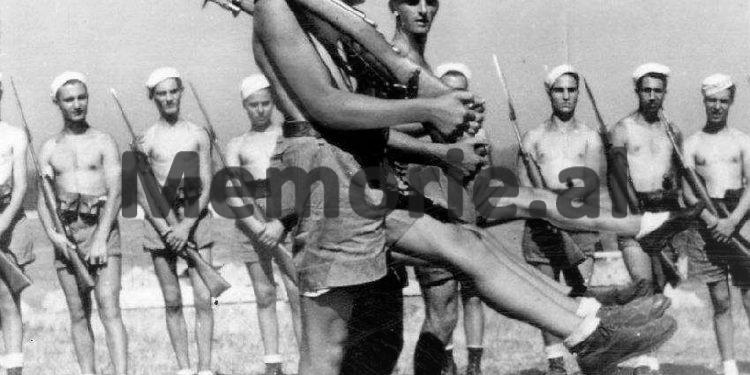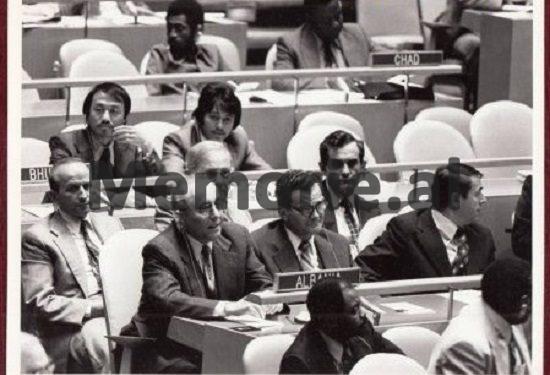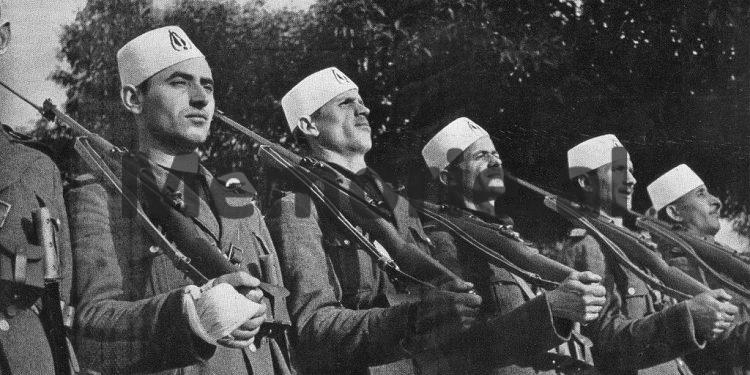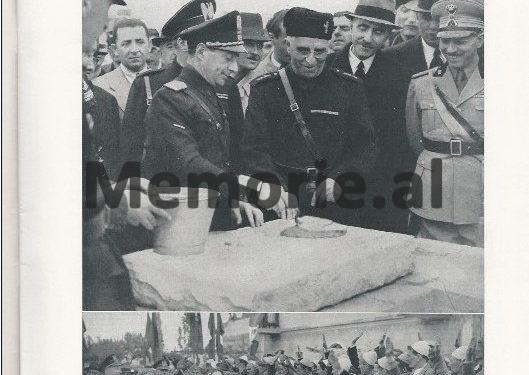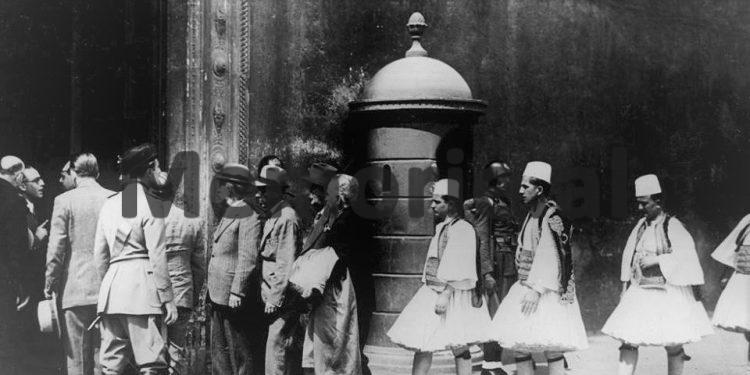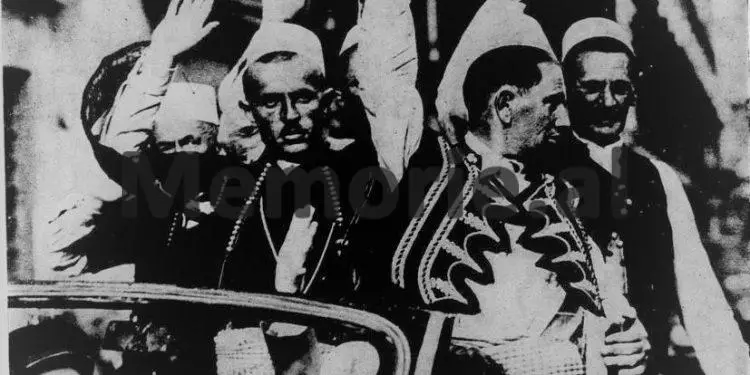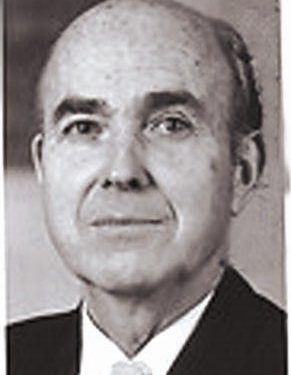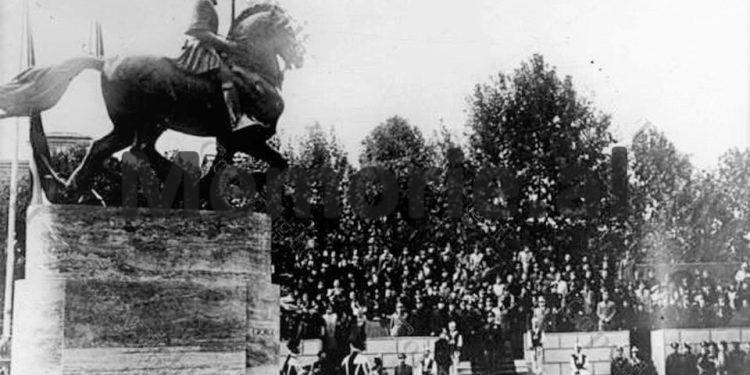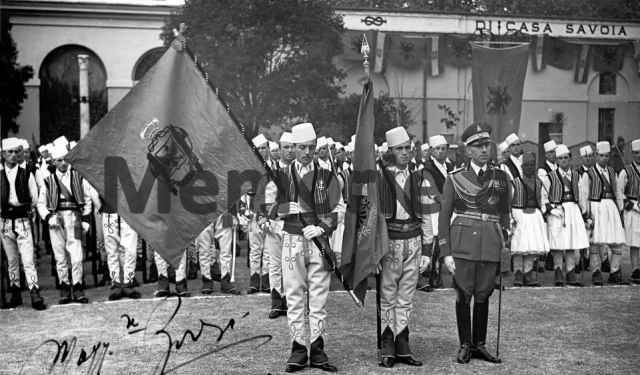Dashnor Kaloçi
Second part
Memorie.al publishes the unknown story of Todi Shyti, originally from the village of Krutje e the bottom in Lushnja and one of the poorest families in Myzeqe during the period of the Zog Monarchy, in April ’39, after the occupation of Albania by fascist Italy of Benito Mussolini, was assigned to the force of 1000 forces that the Albanian Government of Prime Minister Shefqet Vërlaci selected from all districts of the country, for the formation of the Albanian battalion of the Royal Guard, which then under the orders of the commander of the Italian-Albanian battalion, Colonel Alfredo D`Andrea, (who had served as an adviser to the Albanian National Army under Ahmet Zogu, during the Monarchy), was sent to Italy, where he served as a guard of honor at the ‘Curinale’ Palace of King Victor Emmanuel III, until 9 September 1943, when in the early hours of the morning, the King, together with the Prime Minister, Army General Badoglio, left the ‘Curinale’ Palace and went to Brindisi. The rare testimony of Todi Shyti, who returned to Albania in 1993, after a long emigration to the USA where he had settled since 1948, where he tells how after meeting with Nesti Nasen and the financial assistance he gave to the mission Albanian at the United Nations, he was allowed to come to Albania several times since 1974, as well as his engagement with the Republican Party in the US where for several years he financed the electoral campaigns of that party, for which he received thanks from Presidents George Bush and Ronald Reagan.
“Our battalion, which constituted the Albanian National Guard, was stationed in the barracks of the ‘Granatieri Di Sardinia’ Regiment, which was located about three kilometers from the ‘Curinale’ Palace, which was the royal residence of Victor Emmanuel III, where we would perform the service of guard of honor. A few days after our arrival there, on May 9, which was the day of the proclamation of the Italian Empire, we made a military parade in front of Benito Mussolini and King Victor Emmanuel. We performed the service of honor guard at the Royal Palace dressed in the Albanian national costume, which was of two types; of the North and South of Albania. “Every time King Victor Emmanuel passed by us, he greeted us with his hand…”!
This is how Todi Shyti, originally from Lower Krushja in Lushnja, remembered that distant time, after returning to Albania from the United States of America where he had lived since 1948, who testified for the first time the whole life story since leaving the village in 1939, to join the Albanian National Guard of King Victor Emmanuel III and later emigrate to the United States, where he in addition to providing assistance to the Albanian embassy in The League of Nations regularly funded the election campaigns of Republican Presidents Ronald Reagan and George W. Bush and received letters of thanks and appreciation from them. For all these and more events and facts from his life, since the proposal made to him to come as a saboteur to Albania in 1948, the visit to the Albanian embassy in Italy in the early 70s where he asked visa to Albania, meeting and acquaintance with the Albanian diplomat Nesti Nase in the Albanian diplomatic mission to the UN, the financial aid he gave them, lunches and dinners of the Albanian mission staff at his home in New York, frequent visits to Albania after year 1974 and conversations with his family in the district of Lushnja, etc., etc., he knows us in this interview that Memorie.al publishes in two issues of the historical dossier section.
Continued from the previous issue
Mr. Shyti, what happened to your battalion after the departure of King Victor Emmanuel III from the Royal Palace where you also served?
The first week after the departure of King Victor Emmanuel III, our battalion stayed there because it had nowhere to go, unlike the Italians who went through their homes. After the King’s departure, German troops landed in Rome and the city was controlled in parts. I, who was assigned in the background to bring food to our battalion at the “Granatieri Di Sardinia” gas station, continued to do that task that week, but to go to the supply center, I had to get permission. to the Germans, who controlled that part of the city.
What happened next to your battalion?
After the first week where we stayed alone there in the barracks, after the Italians had left, our departure began. All the effective Albanians of that battalion started to flee in the direction of Yugoslavia, where they thought that it would be easier for them to return by land to Albania. Most of them returned to their homes, but there were also those who died on the streets, on that long journey between the bombings of the war.
But you did not return to Albania, near your family?
As I said above, I had sworn that I would never return to Albania, where I had spent a miserable life. After all my Albanian friends took the long way back to their homes in Albania, I moved to the house of my fiancée, Xhina, in Rome, who became my future wife.
When and how did you establish that connection with that Italian girl?
I had known Gina since the beginning of 1943 when I was hospitalized in a military hospital and she came there to meet her brother, Oswaldo, who was hospitalized in a room with me. They invited me to their house and then we made a lifelong friendship, as I married Gina on October 6, 1943, just a few days after the events just mentioned above took place and our Albanian battalion was forced to disintegrated.
After leaving the army, what job did you take in Italy?
With the arrival of the Allied troops in Rome in 1944, the economic situation began to be somewhat adjusted by the aid brought by the Americans. At that time life became so difficult that there was no work for the Italians and no longer for us Albanians. But luck smiled on me because I was hired as a translator at the US Army, having learned English well. I also managed to finish high school, having started school from scratch in Rome since 1939, with the extraordinary permission of the Royal Guard battalion command.
How long did you work there as a translator?
After some time, I quit my job and started as an English translator at a Genoa cruise liner. While working with Americans, I read the newspapers every day and one day I saw that immigrants were being sought to be employed in America. Under US law, Albania had the right to send 304 immigrants to the United States each year. I took the forms and filled them out and then found a man in the US who made me the warranty. After fixing these, I owed a few dollars to some of my Albanian friends, and on September 27, 1948, I set sail for the United States. A year later I took my wife Gina Ceccarelli there.
From the end of the war until 1948, when you left for the United States, did you have any contact with the Albanian political emigration that was scattered in the various camps in Italy?
Around 1947, when I was living with my wife in the city of Genoa in Italy, an Albanian named Musa Kranja came to visit me at home. Musai was a political emigrant in Italy and lived in the Reggio Emilia camp along with many other Albanians. Musai had taken part in the Fier Uprising for the overthrow of King Zog in 1935 and had left Albania after the failure of that uprising. I had no acquaintance with him, but I received him at home with the Albanian habit. He told me: Mr. Todi, I have come here to call, to come with us that we will land with parachutes in Albania. With the help of Anglo-American allies, we will overthrow the communist regime of Enver Hoxha and since he knows the Myzeqe area well, you will command a group of paratroopers who will land in that area.
How did you respond to that offer?
After listening to Musa Kranja until the end, I addressed you: Mr. Musa, when you finish the bread, leave immediately, because the government that is in Albania, belongs to the people and the people love it. I do not intend to come with you to Albania. After my words, Musa left the bread immediately and left the house. Years later, I learned that Musa was killed on the border with Greece, while entering Albania as a saboteur.
But after Musa Kranja, did you have the opportunity to meet other Albanians later?
After that day, I did not have the opportunity to meet other Albanians of political emigration. I at that time but also afterwards loved the Albanian government headed by Colonel-General Enver Hoxha, because it had eliminated the beys and moneybags who had enslaved and oppressed us in the past.
What jobs did you first get in the US?
My trip to the US was not an easy thing. Arriving there I faced many difficulties because I had neither work nor shelter. With effort and great will, as well as with the help of some of my acquaintances, I was able to find work in a factory, where I earned enough to keep my breath alive. Then I found work for my wife Gina. With the help of an Albanian friend of mine from Durrës, named Miti Sidheri, who owed me a lot of dollars, I bought a taxi which I sent to a taxi company. From that job I started earning dollars and clearing debts. I then owed a percentage of a Luxembourg man who worked in the factory where I was and bought another taxi where I hired a driver to work for him. To cover the debts I owed, as well as the rent of the apartment, I quit my job at the factory and worked my own taxi, which I removed from the taxi company. In addition to working as a taxi driver, I enrolled in the Faculty of Philology at New York University, which I graduated without leaving my job for ten years in a row, graduating in Law in 1964. So, from that time I worked as a taxi driver for 35 years, holding the wife and two sons who were born to us afterwards.
When did you come to Albania for the first time and how did you accomplish that?
From 1956 until 1990, almost every year I came on holiday to Italy where we stayed for two months, since we also had the woman’s people there. I really wanted to come to Albania to see my family and for this I applied to the Albanian embassy in Rome. During the meeting for obtaining a visa at that embassy, I was instructed to meet and help the comrades of the Albanian embassy or diplomatic mission who were in New York, near the League of Nations.
Did you meet with the Albanian diplomatic mission in New York?
I met Nesti Nasen who helped me get a visa to Albania. Before coming to Albania, the embassy authorities gave me occasional orders, but I also knew how to speak when I came to Albania. So, when I first came to Albania in 1974, I told my family and fellow villagers in Krutje that they were the freest and happiest people in the world, because the capitalists were drinking our blood there in the West. by means of multiple taxes. After 1974, I came to Albania again in 1978 with my wife. Then almost every two years I came to Albania without any obstacles. This came because I had been a poor peasant and had never been involved in politics and loved the government of Enver Hoxha, as it worked for the people.
What relations did you have with the Albanian embassy in New York?
After the first meeting I had with Ambassador Rako Naço, Nesti Nasen and other staff, I left them my address and phone number, so that they could ask me for any problem they might have. They called me and I helped them fix the embassy vehicle, through some of my friends. I became their friend and they called me whenever they needed and I was there, helping them financially with the embassy problems. Every time the Albanian Foreign Ministers visited New York, I took them with all the embassy staff and rented them to various restaurants and confectioneries. This is what I did with Rako Naço, Nesti Nasen and Reiz Malilen. Likewise, from 1974 to 1990, every month in May, I made it a habit to call all the embassy staff of 7-8 people to my house for lunch. Even the Albanian embassy in New York, appreciated me immensely for the help I gave them and Ambassador Rako Naço often said to me: “You Todi Shyti are enough for 100 Albanian patriots”. Thus, I was the first to be called to every reception given there on the occasion of the various feasts.
What about the senior Albanian leadership in Tirana, did you have any connection?
I had no connection with the top Albanian leadership, except for the Foreign Ministers I met in New York. However, almost every year I send congratulatory telegrams to Enver Hoxha on his birthday. I also sent him a telegram of condolences when Hysni Kapo died, to whom I also sang a song. Even when Enver Hoxha died, I sent a telegram of condolences to Nexhmija. For all the telegrams I sent, our embassy in New York called me and thanked me on their behalf.
What about American politicians?
Although I was never involved in politics, in 1970 I became a member of the Washington-based close Republican 40-member Committee. I liked the Republicans because I was against the economic policy pursued by the Democrats. After joining that Committee, in addition to paying the membership fee, I constantly made financial contributions in various amounts of dollars in all election campaigns. In the 1980s, I had the opportunity to meet President Ronald Reagan over dinner. Given the financial contributions I made to Republicans, Presidents Ronald Reagan and George W. Bush sent me thank-you letters and I returned replies, thus maintaining regular correspondence with them. When Reagan and Bush won the election campaign and ascended the throne of the Presidents of America, they invited me to the ceremonial dinners they gave for the inner circle, but I did not go, since I was busy. “I kept in touch with the American Republicans and funded them regularly until 1995.”
Have you been to Albania forever, or will you return to the US?
After my wife Gina died in 1990, I decided to sell the property I had in New York and return to Albania forever, to settle here in my homeland. So, since 1992, I have settled in Albania, although from time to time I go to the US to see my two sons. /Memorie.al




